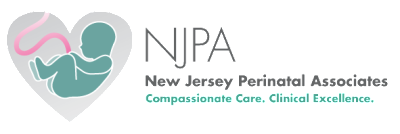July 2021 Updates from NJPA
COVID-19 Vaccination
COVID-19 vaccines are critical for ending the COVID-19 pandemic. Pregnant women are at increased risk for severe illness and death from COVID-19 compared with nonpregnant women of reproductive age. Pregnant women with COVID-19 are also at increased risk of adverse pregnancy outcomes such as preterm birth and possibly stillbirth.
Pregnant women are eligible for and can receive any of the three COVID-19 vaccines available in the US. The Society for Maternal-Fetal Medicine strongly recommends that pregnant women have access to the COVID-19 vaccines. On June 15th, 2021, the CDC released a report summarizing COVID-19 vaccination coverage among pregnant women in the United States from December 14th, 2020 through May 8th, 2021, through the Vaccine Safety Datalink (VSD). VSD is a collaboration between the CDC and nine health care systems in the United States that serve approximately 2.7 million women aged 18-49 years.
As of May 8th, 2021, a total of 135,968 pregnant women were identified. Among these 135,968 women, 22,197 (16.3%) had received ≥1 dose of a COVID-19 vaccine during pregnancy and 15,043 (11.1%) had completed their vaccination series. Vaccination was lowest among Hispanic (11.9%) and non-Hispanic Black women (6.0%) and women aged 18-24 years (5.5%). It was highest among non-Hispanic Asian women (24.7%) and women aged 35-49 years (22.7%).
Improving outreach to and engagement with health care providers and pregnant women should increase vaccine confidence and thus coverage of COVID-19 vaccination in this population. Although low, COVID-19 vaccination coverage among pregnant women is expected to increase as vaccine availability and access improve and as more reassuring safety data become available.
COVID-19 Vaccines
There are currently three COVID-19 vaccines authorized for use in the United States. Two are mRNA vaccines (Pfizer-BioNTech and Moderna), and one is an adenoviral-vector vaccine (Janssen/J&J). None of the currently authorized vaccines contain live virus.
Both mRNA vaccines elicit neutralizing antibody responses to a SARS-CoV-spike protein and confer superior protective immunity compared to immunity from natural infection. There is no risk of genetic modification to people receiving the vaccine.
The Janssen one dose vaccine uses an adenovirus to carry the gene for the coronavirus spike protein into the host cell. Once inside the cell, more spike protein is produced, expressed on the cell membrane, triggering both an antibody and cell-mediated response. The risk from adenovector vaccines is low as the viral DNA is not integrated into the host’s DNA.
On April 13, 2021, the US FDA and CDC jointly recommended a pause to use of the Janssen vaccine due to reports of a rare, severe type of blood clot called cerebral venous sinus thrombosis (CVST) in combination with low levels of platelets. A total of 15 cases of thrombosis had been reported to the Vaccine Adverse Event Reporting System. All of the cases occurred in women between the ages of 18-59, between 6-15 days after vaccination. None of the reported cases to date have occurred in pregnant people.
After review of the data, the FDA and CDC concluded that the chance of developing thrombosis following vaccination with the Janssen vaccine is very low and that the benefits of the vaccine outweigh the risks. Both agencies recommended resumption of the use of the vaccine effective April 23rd, 2021.
COVID-19 Vaccination
The Society for Maternal-Fetal Medicine (SMFM) recommends following the CDC guidelines for vaccine administration
o Vaccination should be offered regardless of history of prior symptomatic or asymptomatic coronavirus (COVID-19) infection
o Viral or serologic testing for acute or prior infection is not recommended for the purpose of vaccine decision-making
o Vaccination should not be given if the recipient is acutely ill or within 14 days from receiving another vaccine
o A pregnancy test prior to vaccination is not recommended
o Available data do not indicate the need to delay attempting pregnancy following vaccination
o There are no data to guide timing of vaccination during pregnancy therefore, the vaccine should be offered independent of trimester
Meet our perinatologist… Wendy Warren, MD
 Dr. Wendy Warren is one of our Maternal-Fetal Medicine specialists at New Jersey Perinatal Associates and has been a valued member of our team since 2003. She grew up in Yorktown Heights, NY, graduated from Wellesley College in Wellesley, Massachusetts and received her MD degree from Cornell University Medical College in New York. Dr. Warren completed her residency in Obstetrics and Gynecology at Thomas Jefferson University Hospital in Philadelphia, Pennsylvania and came to Columbia Presbyterian Medical Center in New York for her fellowship training in Maternal-Fetal Medicine where she stayed on the faculty until 1996.
Dr. Wendy Warren is one of our Maternal-Fetal Medicine specialists at New Jersey Perinatal Associates and has been a valued member of our team since 2003. She grew up in Yorktown Heights, NY, graduated from Wellesley College in Wellesley, Massachusetts and received her MD degree from Cornell University Medical College in New York. Dr. Warren completed her residency in Obstetrics and Gynecology at Thomas Jefferson University Hospital in Philadelphia, Pennsylvania and came to Columbia Presbyterian Medical Center in New York for her fellowship training in Maternal-Fetal Medicine where she stayed on the faculty until 1996.
She has contributed many publications in the Maternal-Fetal Medicine field and her research interests include fetal-placental endocrine function and mechanisms of labor initiation.
